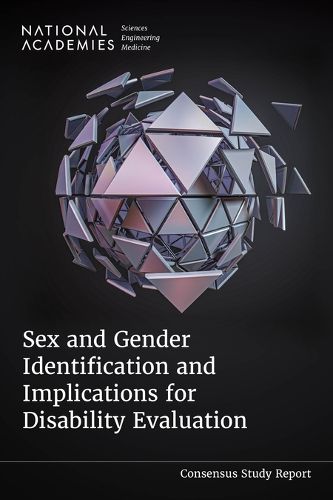Readings Newsletter
Become a Readings Member to make your shopping experience even easier.
Sign in or sign up for free!
You’re not far away from qualifying for FREE standard shipping within Australia
You’ve qualified for FREE standard shipping within Australia
The cart is loading…






Transgender and gender diverse (TGD) people and people with variations in sex traits (VSTs) can experience serious health challenges and often have a greater burden of disability or greater morbidity from chronic disease compared with the general population.
"Transgender and gender diverse" refers to people whose gender identity differs from what is typically associated with their sex recorded at birth. "Variations in sex traits" refers to genetic, anatomical, and hormonal variations that affect the genitourinary tract and reproduction systems; individuals with VSTs may have a sex and/or gender identity that differs from their sex recorded at birth.
The U.S. Social Security Administration (SSA) asked the National Academies to convene a committee of experts to evaluate how contemporary conceptions of sex and gender in medicine and current clinical guidelines impact disability determinations. The resulting report offers conclusions in key areas including (1) the collection of data on sex and gender identity, (2) disability considerations for SSA' Listings of Impairments (medical criteria that apply to the evaluation of disability) with sex-specific diagnostic criteria, (3) inclusive language in disability Listings of Impairments, and (4) guidance for adjudicators on assessing disability for TGD applicants and applicants with VSTs.
Table of Contents
Front Matter Summary 1 Introduction Part I: Sex and Gender Data Collection and Clinical Practice 2 Clinical Conceptions of Sex and Gender 3 Data on Sexual Orientation and Gender Identity: Collection and Use in the Clinical Practice of Medicine Part II: Affirming Treatment and Care for Transgender and Gender Diverse People and People with Variations in Sex Traits 5 Gender-Affirming Care for Transgender and Gender Diverse People 6 Common Co-occurring Conditions and Impacts of Gender-Affirming Care on Chronic Conditions in Transgender and Gender Diverse Populations 7 Care for Individuals with Variations in Sex Traits Part III: Sex, Gender, and Disability Determinations Introduction 8 Chronic Respiratory Disorders 9 Childhood Growth Failure 10 Chronic Kidney Disease 11 Cancers of the Reproductive System 12 Considerations for HIV Manifestations Specific to Women 13 Considerations for Disability Adjudication for Transgender and Gender Diverse Applicants and Applicants with Variations in Sex Traits 14 Overall Conclusions Appendix A: Public Meeting Agendas Appendix B: Committee Member Biosketches Appendix C: Commissioned Paper: Physiological Sex Differences and the Effect of Gender-Affirming Hormone Therapy
$9.00 standard shipping within Australia
FREE standard shipping within Australia for orders over $100.00
Express & International shipping calculated at checkout
Transgender and gender diverse (TGD) people and people with variations in sex traits (VSTs) can experience serious health challenges and often have a greater burden of disability or greater morbidity from chronic disease compared with the general population.
"Transgender and gender diverse" refers to people whose gender identity differs from what is typically associated with their sex recorded at birth. "Variations in sex traits" refers to genetic, anatomical, and hormonal variations that affect the genitourinary tract and reproduction systems; individuals with VSTs may have a sex and/or gender identity that differs from their sex recorded at birth.
The U.S. Social Security Administration (SSA) asked the National Academies to convene a committee of experts to evaluate how contemporary conceptions of sex and gender in medicine and current clinical guidelines impact disability determinations. The resulting report offers conclusions in key areas including (1) the collection of data on sex and gender identity, (2) disability considerations for SSA' Listings of Impairments (medical criteria that apply to the evaluation of disability) with sex-specific diagnostic criteria, (3) inclusive language in disability Listings of Impairments, and (4) guidance for adjudicators on assessing disability for TGD applicants and applicants with VSTs.
Table of Contents
Front Matter Summary 1 Introduction Part I: Sex and Gender Data Collection and Clinical Practice 2 Clinical Conceptions of Sex and Gender 3 Data on Sexual Orientation and Gender Identity: Collection and Use in the Clinical Practice of Medicine Part II: Affirming Treatment and Care for Transgender and Gender Diverse People and People with Variations in Sex Traits 5 Gender-Affirming Care for Transgender and Gender Diverse People 6 Common Co-occurring Conditions and Impacts of Gender-Affirming Care on Chronic Conditions in Transgender and Gender Diverse Populations 7 Care for Individuals with Variations in Sex Traits Part III: Sex, Gender, and Disability Determinations Introduction 8 Chronic Respiratory Disorders 9 Childhood Growth Failure 10 Chronic Kidney Disease 11 Cancers of the Reproductive System 12 Considerations for HIV Manifestations Specific to Women 13 Considerations for Disability Adjudication for Transgender and Gender Diverse Applicants and Applicants with Variations in Sex Traits 14 Overall Conclusions Appendix A: Public Meeting Agendas Appendix B: Committee Member Biosketches Appendix C: Commissioned Paper: Physiological Sex Differences and the Effect of Gender-Affirming Hormone Therapy